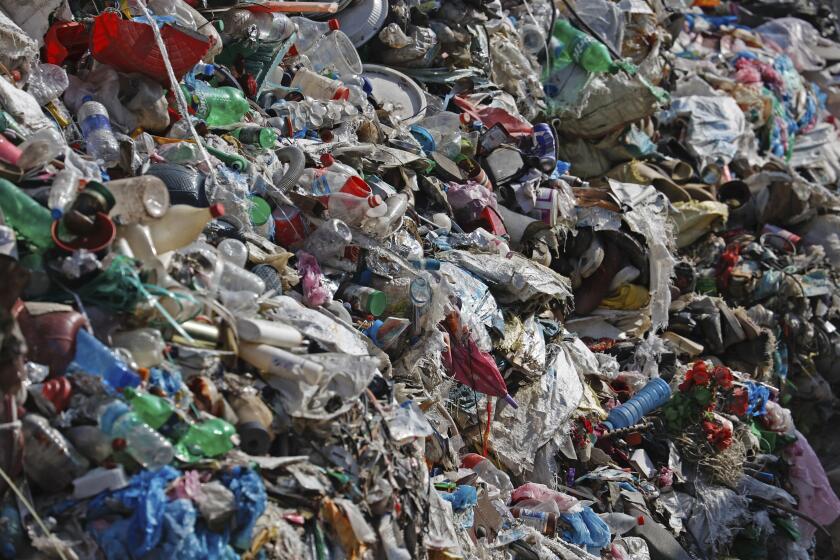Staging Congo Vote Is Grand Undertaking
In a neighborhood where half-clad toddlers play in streets filled with garbage, Therese Olenga Kalonda stood in front of the crowd of Sunday churchgoers and told them how to change their lot.
“You have a vote, and it is free, and it is secret,” she told families who had come to worship at a tin-roofed, open-air church. “If the person you vote in doesn’t keep their promises, you can vote them out.”
It was a basic lesson from Madame Therese, as she is known, a prominent women’s rights activist who is running for parliament in Congo’s July 30 elections. But it is an important one for the many people who cannot remember a free, multiparty election in the Democratic Republic of Congo, formerly known as Zaire.
The last one was in 1965, and since then the country has known only dictators, competing militias and the aftermath of war.
If learning how to vote is simple, conducting the election will be far from it. Olenga is among 9,700 candidates running for 500 seats in the National Assembly. The ballot in Kinshasa, the capital, unfolds to six pages, each the size of a road map, with tiny, fuzzy pictures next to each contender’s name.
The election has been postponed four times. Part of the difficulty is simply getting the ballots to polling stations scattered throughout Congo, a country about a fourth the size of the U.S. with only 300 miles of paved roads.
It is the largest election the United Nations has tried to organize, with more than 26 million registered voters and 50,000 polling stations. It took 75 aircraft sorties to get the ballots -- 1,810 tons of them -- into the country.
“Given the DRC’s history and the logistical challenges we face, many people thought that organizing these elections would be almost impossible,” said Apollinaire Malu-Malu, the president of the Independent Electoral Commission. “And yet, I believe the country will be ready for this pivotal moment.”
A consortium of U.N. agencies, European aid groups and independent democracy-building institutions such as the Carter Center have worked hard behind the scenes to make it happen.
William Lacy Swing, the U.N. special envoy to Congo, downplayed growing tensions among militia groups battling over resources and power in the eastern provinces of Katanga, Ituri, and North and South Kivu near the borders with Rwanda and Uganda, where there is still fighting.
There is some form of unrest in nearly every province, and the United Nations has deployed its largest peacekeeping force, 17,000 troops, to try to ensure order.
“We’ve got to be vigilant,” Swing said. “There may be pockets of disturbances, but it won’t disrupt the elections. We are convinced of that.”
Perhaps the biggest challenge in a country where several presidential candidates have private militias will be to get the losers to accept the results.
The current transitional government is a hodgepodge of interests stitched together as part of the peace deal that ended Congo’s latest war in December 2002. That conflict raged for five years, drawing in six countries and causing the deaths of about 4 million people.
President Joseph Kabila, installed after the 2001 assassination of his father, Laurent Kabila, is favored overwhelmingly among 33 candidates for president. His only viable challenger, Etienne Tshisikedi, is boycotting the elections.
The transitional government has been nearly paralyzed by its divisions. Kabila’s four vice presidents represent factions previously at war with each other. Three are running for office and two of them, former militia leaders Azarias Ruberwa and Jean-Pierre Bemba, have loyal armies standing by to press their cause.
Some government leaders are widely thought to have used their offices to get rich.
That has left people in the neighborhood where Madame Therese was preaching democracy bitter and resentful, with little but hope and prayer. In one block, there were four storefront churches, but no clinics, stores or other services.
“I am against the current government. It is bogus; it’s a fake,” said Levi Boketshu, 22, who said that like most other young men in the area, he is unemployed. “People are sick, the streets are dirty, there is not enough to eat. There is no clean water, no electricity. We are in all ways suffering.”
At night, residents said, the once-vibrant area is plunged into darkness because of power failures. The graffiti on one whitewashed wall says, “Pray for electricity.”
Madame Therese walked gingerly through the littered streets, greeting people, then shook her head.
“This city was once known as Kinshasa the beautiful, Kinshasa la belle,” she said. “Now it is called Kinshasa, la poubelle. Kinshasa the garbage can.”
The winners must confront lofty expectations and work to bring a new beginning for the country, not the birth of a new crisis, observers say.
Some of the campaigns have focused on elements such as the purity of national identity that are meant to divide rather than unite. Candidates who control media outlets have resorted to the equivalent of hate radio, Malu-Malu said.
“We are waiting for a candidate who can show us how he can change the country,” said Florence Mafuta, a 42-year-old sales clerk who earns just enough to send two of her four children to school. “But they are only talking about each other.
“We want peace. We want work. We want a leader.”
More to Read
Sign up for Essential California
The most important California stories and recommendations in your inbox every morning.
You may occasionally receive promotional content from the Los Angeles Times.









